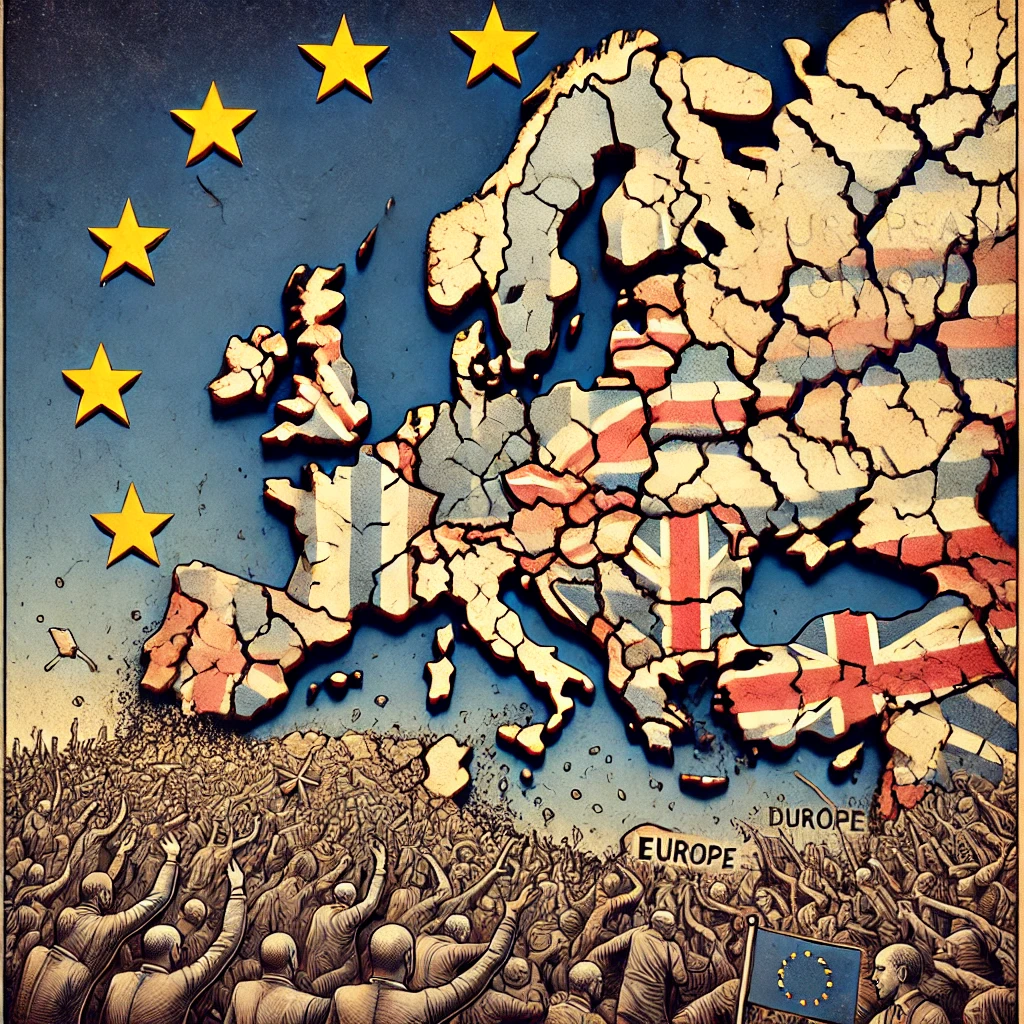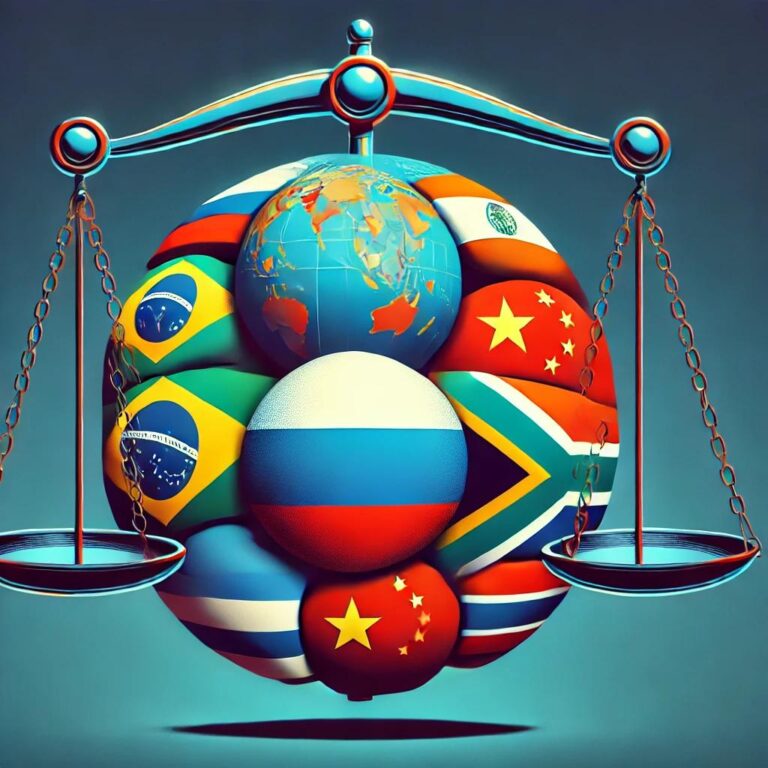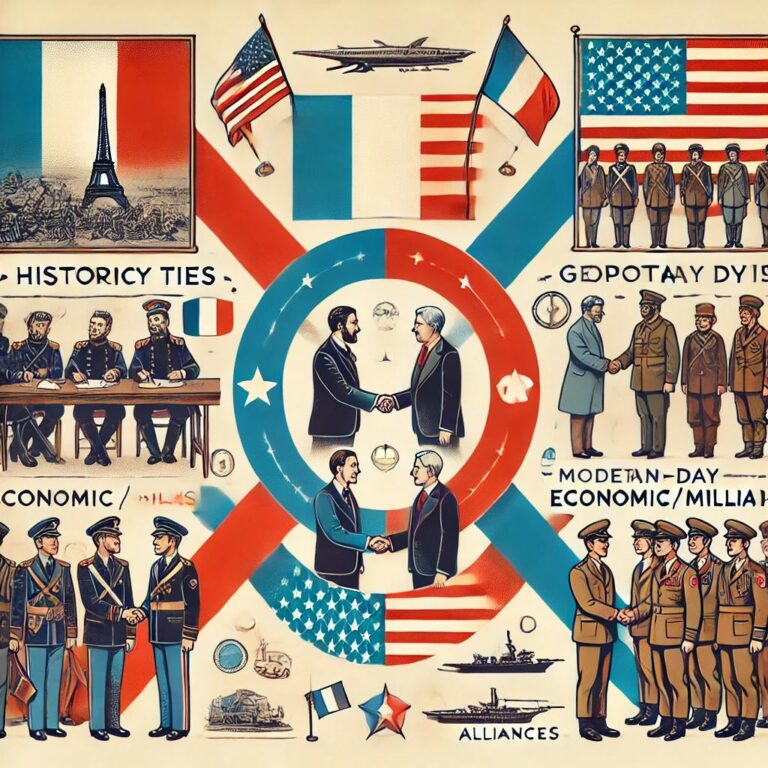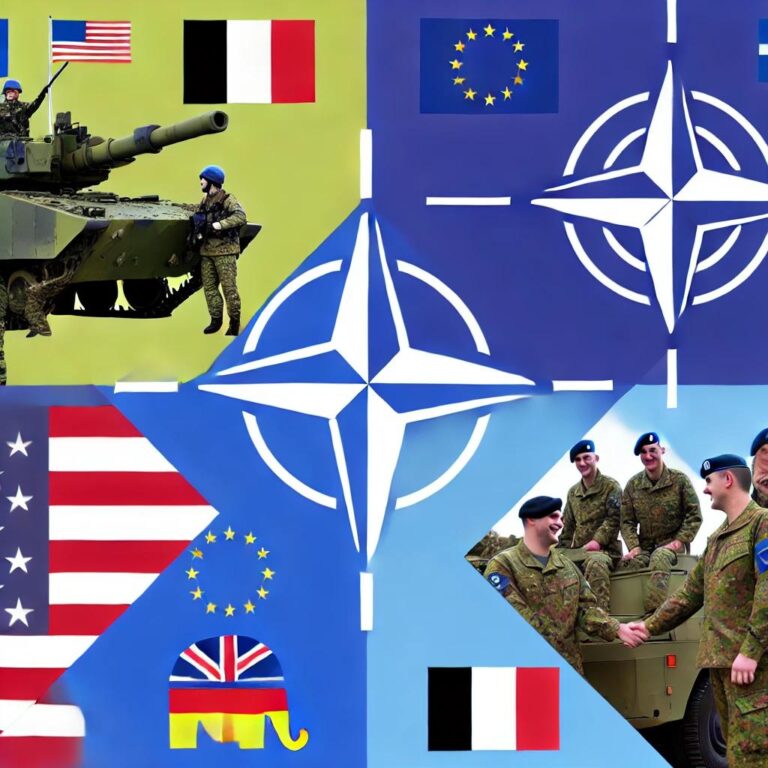
Introduction: Understanding Europe’s Waning Global Influence
Global influence, defined as the ability of a country or a group of countries to shape international policies, economic trends, and cultural norms, remains a critical metric of power in the contemporary world. Europe, once a formidable player on the global stage, has witnessed a gradual decline in its influence over recent decades. This shift in global dynamics is not merely a matter of external pressures; it is deeply intertwined with the internal political landscapes of European nations.
The decline of European influence can be attributed to a myriad of internal political dynamics, ranging from the rise of populist movements to challenges in maintaining unity among member states of the European Union. These internal political shifts have not only impacted Europe’s cohesion but have also weakened its stance in global geopolitics and international relations. The intricate relationship between domestic politics and global influence prompts a need for a thorough analysis to understand the ongoing changes.
Moreover, the significance of Europe’s global influence, historically rooted in its colonial past and economic power, has been further compromised by evolving geopolitical realities. The advent of new global players and shifting alliances necessitates a reevaluation of Europe’s role in the world. The continent’s ability to navigate these changes while grappling with internal discord is paramount to its future standing on the global stage.
This analysis seeks to delve into the recent political shifts within European countries and how these changes contribute to the continent’s diminishing influence. Understanding the factors that drive internal political dynamics and their subsequent effect on global positioning is crucial for policymakers, scholars, and international observers. The following sections of this blog post will explore these themes in detail, providing a comprehensive look at the multifaceted nature of Europe’s waning influence.
Brexit: The Catalyst for European Disunity
The decision of the United Kingdom to exit the European Union, commonly referred to as Brexit, served as a significant disruptor to the political and economic cohesion of Europe. The immediate aftermath of the referendum in June 2016 saw profound shifts in European diplomacy and trade, affecting not just the UK but the entire continent. The departure of one of the EU’s largest economies posed substantial logistical and economic challenges, compelling other member states to reconsider their positions within the union.
Brexit revealed and exacerbated existing fractures within the EU, leading to a period of introspection and re-evaluation among member countries. The negotiation process, fraught with tension and complexity, highlighted the difficulties in maintaining a unified stance when individual national interests came into conflict. This disunity weakened the EU’s negotiating power on the global stage, as the bloc struggled to present a cohesive front in international trade agreements and diplomatic negotiations.
The long-term impacts of Brexit extend beyond mere economic disruption. It has emboldened nationalist and populist movements across Europe, who view the UK’s departure as a viable precedent for their own agendas. Countries like Italy, Hungary, and Poland have seen a surge in anti-EU rhetoric, challenging the principles of solidarity and cooperation that underpin the union. This rise in nationalism further strains the EU’s internal cohesion, as diverging national priorities make it increasingly difficult to achieve consensus on critical issues.
Additionally, the EU’s diminished unity has broader implications for its global influence. The bloc’s capacity to act as a singular, powerful entity in global politics is compromised, reducing its effectiveness in addressing international challenges such as climate change, security threats, and economic instability. The Brexit-induced fragmentation serves as a reminder of the fragility of political alliances and the importance of internal unity in maintaining global standing.
The Rise of Nationalism and Populism
In recent years, Europe has witnessed a significant rise in nationalist and populist movements. This trend marks a departure from the traditional pro-European Union stance that has characterized the continent’s post-World War II era. Countries such as Italy, Hungary, and Poland have emerged as epicenters of this shift, fundamentally altering both domestic and foreign policies.
The ascent of these movements often stems from a growing discontent with the perceived elitism and inefficacy of established political systems. Nationalist parties capitalize on fears about economic instability, cultural dilution, and a loss of sovereignty. This political climate has led to the implementation of policies that prioritize national interests over collective European objectives.
In Italy, the rise of parties like Lega Nord has brought about stringent immigration controls and a more Eurosceptic foreign policy. Hungary’s Fidesz government, under Viktor Orbán, has also pursued an agenda that sharply contrasts with EU norms, focusing on anti-immigration measures and what it terms ‘illiberal democracy.’ Similarly, Poland’s Law and Justice Party (PiS) has adopted policies that challenge the EU’s regulatory framework, fostering a climate of judicial reforms and media restrictions that have raised concerns over democratic backsliding.
These nationalist and populist agendas pose significant challenges to European unity. The anti-EU sentiment prevalent in these movements undermines the cohesion necessary for a unified European voice on the global stage. For instance, restrictive immigration policies not only create friction within the EU but also tarnish its image as a bastion of human rights and tolerance. Furthermore, diverging foreign policies weaken Europe’s collective bargaining power, making it less effective in addressing global issues such as climate change, trade regulations, and geopolitical tensions.
The rise of nationalism and populism thus represents a critical juncture for Europe. The increasing traction of these movements necessitates a reevaluation of the EU’s approach to governance, integration, and its role in the global arena. Without addressing the underlying causes of this populist surge, the European Union risks further fragmentation and a continued decline in its global influence.
Economic Challenges and Policy Divergence
Europe has been grappling with a series of economic challenges that have significantly impacted its global influence. One of the most pressing issues is the persistent slow economic growth across many member states. While some countries have managed to achieve modest growth, others continue to struggle, leading to disparities within the European Union (EU). High unemployment rates further exacerbate this problem, particularly in nations such as Greece and Spain, where youth unemployment remains alarmingly high. This not only creates social unrest but also hampers long-term economic stability.
The debt crises that have plagued countries like Greece and Spain have also contributed to the economic instability within the EU. The stringent austerity measures imposed as a condition for financial assistance have had mixed results. While they have been somewhat successful in stabilizing public finances, they have also led to severe economic contractions, increased poverty, and social discontent. These measures have often been a source of contention among EU member states, leading to internal conflicts and divisions.
Policy divergence among EU countries further complicates the situation. Northern European countries, generally more economically stable, often advocate for stringent fiscal policies and austerity measures. In contrast, Southern European countries, which have been hit harder by economic downturns, push for more flexible fiscal policies and greater financial support. This north-south economic divide has made it challenging for the EU to present a cohesive economic strategy on the global stage. The lack of a unified approach weakens Europe’s ability to influence global economic forums and negotiate effectively on international economic policies.
Compounding these issues is the differing pace of economic recovery among member states, which hampers coordinated efforts to address broader economic challenges. The inability to agree on common fiscal policies or economic strategies not only undermines the EU’s internal cohesion but also diminishes its global economic standing. As Europe continues to navigate these economic challenges and policy divergences, its influence on the global economic stage remains uncertain and weakened.
The Impact of Internal Political Scandals
In recent years, a series of political scandals across Europe has significantly undermined trust in political institutions, thereby weakening the continent’s global standing. Eastern Europe, for example, has been particularly plagued by corruption scandals that have not only tarnished the reputation of individual countries but have also raised questions about the integrity of the European Union as a whole. High-profile cases in Hungary and Romania, where government officials have been implicated in large-scale corruption, have revealed systemic issues that demand urgent reform. These scandals have eroded public trust and have created an environment of skepticism towards political leadership.
Italy has also experienced significant political instability, a recurring theme in its modern political landscape. The frequent changes in government and the rise of populist movements have contributed to a sense of unpredictability and instability. This political volatility has damaged Italy’s credibility on the international stage, making it a less reliable partner in European and global affairs. The constant flux in leadership has hindered long-term policy planning and weakened Italy’s ability to present a coherent stance in international negotiations.
Germany, often viewed as the stabilizing force in European politics, has not been immune to leadership crises. Chancellor Angela Merkel’s long tenure saw Germany through numerous challenges, but her departure has left a vacuum that has not yet been effectively filled. The transition to new leadership has been fraught with challenges, including coalition tensions and disagreements on key policy issues. This has led to a perception of diminished leadership, which has, in turn, weakened Germany’s influence within the EU and beyond.
These internal political scandals and crises have collectively weakened Europe’s credibility and negotiating power in international relations. The erosion of trust in political institutions has made it difficult for European countries to present a united front on global issues. As a result, Europe’s position on the global stage has been compromised, impacting its ability to effectively advocate for its interests in an increasingly competitive international environment.
The Struggle for a Unified Foreign Policy
The European Union’s aspiration to present a cohesive foreign policy on the global stage is frequently hampered by the diverse and, at times, conflicting interests of its member states. The challenge in forming a unified stance is exemplified by the varied approaches to key international relations, particularly concerning Russia, China, and the United States.
Relations with Russia highlight the discord among EU countries. While nations such as Germany and France have historically advocated for engagement and dialogue, Eastern European members like Poland and the Baltic states favor a more hardline approach, driven by historical tensions and security concerns. This divergence undermines the EU’s ability to enact a strong, collective strategy towards Russia.
Similarly, the relationship with China reveals a lack of consensus. Some member states, attracted by economic opportunities, have strengthened bilateral ties with Beijing, sometimes at the expense of a coordinated EU policy. Countries like Italy have embraced initiatives such as the Belt and Road Initiative, while others, wary of China’s growing influence, advocate for a more cautious and unified European stance.
The transatlantic relationship with the United States further illustrates these internal divisions. While traditionally a cornerstone of EU foreign policy, recent years have seen varying levels of alignment with U.S. policies, particularly during the Trump administration. Differences in approaches to trade, climate change, and defense spending have occasionally strained the cohesion of EU foreign policy.
The EU’s institutional framework also contributes to these challenges. The requirement for unanimity in foreign policy decisions often results in watered-down compromises that fail to reflect the positions of all member states. The European External Action Service (EEAS) and the role of High Representative for Foreign Affairs and Security Policy are intended to streamline and strengthen the EU’s foreign policy, but their effectiveness is often limited by the need to balance national interests.
The struggle for a unified foreign policy within the EU is thus a complex interplay of national interests and institutional limitations, which continues to weaken its global position and influence.
The Role of Immigration and Integration Policies
Immigration and integration policies have played a crucial role in shaping the internal dynamics of European nations, often contributing to the continent’s diminishing global influence. The refugee crisis that peaked around 2015 brought this issue into sharp focus. Thousands of refugees from war-torn regions, particularly Syria, sought asylum in Europe, leading to varied responses from different countries. Germany, under Chancellor Angela Merkel, adopted an open-door policy, welcoming over a million refugees. In stark contrast, countries like Hungary and Poland adopted stringent measures to limit refugee intake, reflecting a divided European stance.
These disparate policies have given rise to significant social and political tensions within the continent. In countries with more open policies, such as Germany and Sweden, the influx of refugees has led to debates over social integration, cultural assimilation, and economic impact. Anti-immigration sentiments have fueled the rise of far-right political parties, challenging the traditional political landscape and creating further divisions. On the other hand, countries with restrictive policies have faced criticism from both within and outside Europe for their perceived lack of solidarity and humanitarianism.
The impact of immigration and integration policies extends beyond domestic politics, influencing Europe’s image on the global stage. The inconsistent and often contradictory approaches have weakened Europe’s position in international humanitarian and human rights discussions. The European Union’s struggle to present a unified front has undermined its credibility and bargaining power in global forums. Furthermore, the internal discord has distracted European nations from addressing broader geopolitical challenges, thereby eroding their collective influence.
In summary, the varied immigration and integration policies across Europe have not only created internal divisions but have also weakened the continent’s global standing. As Europe grapples with the complexities of these issues, its ability to exert influence on the international stage continues to wane, reflecting the urgent need for cohesive and comprehensive policy strategies.
Conclusion: The Path Forward for Europe
Throughout this analysis, we have seen how internal political dynamics have significantly impacted Europe’s global standing. The fragmentation within the European Union, driven by divergent national interests and political ideologies, has undermined the continent’s ability to present a united front on the international stage. This disunity not only hampers effective foreign policy but also weakens economic stability and collective security measures. For Europe to regain its global influence, a strategic shift towards greater political cohesion and policy coherence is imperative.
One of the critical steps forward is fostering stronger political unity among EU member states. By aligning more closely on key issues, Europe can enhance its collective bargaining power and present a unified stance in global affairs. This could involve revisiting the decision-making processes within the EU to ensure more inclusive and representative governance that accommodates the diverse interests of all member nations.
Addressing economic disparities within the region is another essential strategy. Economic inequality between and within member states not only fuels political fragmentation but also erodes social cohesion. Implementing policies that promote equitable growth, support innovation, and enhance competitiveness can help bridge these gaps. Strengthening economic ties and developing a more integrated market could also reinforce Europe’s position as a formidable economic bloc.
Furthermore, creating a unified foreign policy is crucial for Europe to assert its influence globally. A coherent approach to international relations, defense, and strategic partnerships will enable Europe to navigate complex geopolitical landscapes more effectively. Collaborative initiatives such as joint military strategies and coordinated foreign aid can enhance Europe’s role as a proactive and influential global player.
In addressing these challenges, Europe must leverage its shared values and historical experience to foster greater solidarity. By prioritizing unity and coherent policies, Europe can navigate its internal complexities and reclaim its position as a leading force on the global stage.



